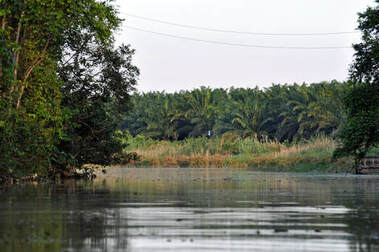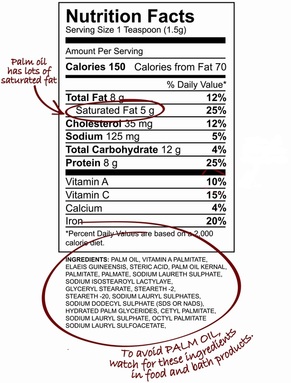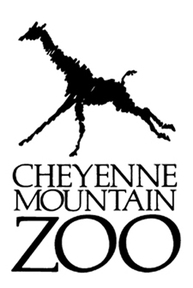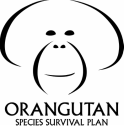Palm Oil

The single greatest threat facing wild orangutans today is the rapidly expanding palm oil industry.
Palm oil is a vegetable oil derived from the African oil palm tree. Millions of acres of rainforest in Borneo and Sumatra are cut down each year to create more oil palm plantations. After first logging tracts of rainforest (thereby getting an initial cash infusion from selling the decimated timber), palm oil companies often use uncontrolled burning to clear the land for their crop.
Palm oil is now the most widely produced edible oil, and is found in a huge variety of common household products, from foods to cosmetics to bath products to candy. The increased demand for palm oil is fueling accelerated destruction of the rainforest habitat of orangutans, pushing these already endangered apes even closer to extinction and at an ever faster rate. Some experts estimate that at the current rate of habitat destruction for palm oil, orangutans could face extinction in as few as 10-15 years.
Palm oil is a vegetable oil derived from the African oil palm tree. Millions of acres of rainforest in Borneo and Sumatra are cut down each year to create more oil palm plantations. After first logging tracts of rainforest (thereby getting an initial cash infusion from selling the decimated timber), palm oil companies often use uncontrolled burning to clear the land for their crop.
Palm oil is now the most widely produced edible oil, and is found in a huge variety of common household products, from foods to cosmetics to bath products to candy. The increased demand for palm oil is fueling accelerated destruction of the rainforest habitat of orangutans, pushing these already endangered apes even closer to extinction and at an ever faster rate. Some experts estimate that at the current rate of habitat destruction for palm oil, orangutans could face extinction in as few as 10-15 years.
The AZA has published a Position Statement on this issue as well as a statement regarding Sustainable Palm Oil

Palm oil is ubiquitous, and it goes by many names – palm kernel oil, palmitate, palmitic acid, and stearic acid, to name only a few – so it can be challenging to even identify which products include the oil. This graphic shows some of the names to look for on product labels to identify palm oil in the things you buy.
The way palm oil is grown makes all the difference: Palm oil plantations and mills that are certified as sustainable by the Roundtable on Sustainable Palm Oil (RSPO) have met many criteria to achieve certification. Palm oil plantations and mills that are not certified as sustainable by the RSPO do not have to adhere to RSPO regulations. Therefore, consumers can’t be sure whether or not the palm oil coming from non-RSPO producers has harmed native wildlife, violated the rights of indigenous people, or had other negative environmental impacts.
Indonesia is facing the highest rate of tropical rain forest loss in the world. There are millions of acres of degraded land available that could be used for palm oil plantations. Instead, many companies choose to use high conservation value rainforests in order to gain the additional timber profits.
An easy way to find out whether or not the products you buy are orangutan-friendly is to download the FREE smartphone app from the Cheyenne Mountain Zoo. The app includes more than 5,000 products whose manufacturers are certified by the RSPO. Purchasing products from these companies helps save orangutan habitat and lives!
|
As a consumer who cares about animal conservation, use this guide to show your love by purchasing products made by companies that are members of the Roundtable on Sustainable Palm Oil. Support these companies committed to making a difference for wild orangutans and other endangered species by using certified sustainable palm oil that is deforestation-free.
Learn More Here DOWNLOAD the Sustainable Palm Oil Shopping Guide App v2.0: |

The Cheyenne Mountain Zoo in Colorado Springs, CO, has taken the lead in palm oil education for the AZA and for the Orangutan SSP. Visit the Cheyenne Mountain Zoo web site to learn about palm oil, its impact on orangutans and other species, and what you can do about the crisis. In addition to the free smartphone app, you can also download a list of "elevator speech" ideas to make it easy to tell others about the palm oil crisis, and many other resources to help you become an informed consumer.
Cheyenne Mountain Zoo has released all of their extensive palm oil information into the public domain in an effort to promote the timely dissemination of knowledge surrounding palm oil, and the zoo grants anyone the right to use this work for any purpose, without any conditions. The Orangutan SSP encourages all participating zoos to take advantage of this tremendous resource and link the information to their own web pages to help spread the word!
Thanks, Cheyenne Mountain Zoo!
Cheyenne Mountain Zoo has released all of their extensive palm oil information into the public domain in an effort to promote the timely dissemination of knowledge surrounding palm oil, and the zoo grants anyone the right to use this work for any purpose, without any conditions. The Orangutan SSP encourages all participating zoos to take advantage of this tremendous resource and link the information to their own web pages to help spread the word!
Thanks, Cheyenne Mountain Zoo!
 Updated August 2016
Updated August 2016
Why Not Just Boycott Palm Oil?
Some people feel that the solution is to boycott palm oil in order to combat the destructiveness of the industry. Doing so is an option for consumers, but a more effective, reasonable, and responsible choice is to opt for products that use Certified Sustainable Palm Oil (CSPO). This is because oil palms are tremendously productive crops – they can produce up to 10 times more oil per acre than other oil crops – and this means that palm oil can be an environmentally friendly oil because less land has to be cleared to get the same amount of product. Palm oil is a large part of the economy for Indonesia; without it, unemployment would increase in a part of the world already struggling with widespread poverty. And finally, the demand for edible oils is not going to go away; it will only increase as the human population continues to expand. Boycotting palm oil will only create a demand for another oil crop to take its place, with similar consequences.
Certified Sustainable Palm Oil (CSPO) is palm oil from a grower that has made a commitment to produce palm oil in a way that minimizes its impact on wildlife, indigenous people, and the planet. We all must demand that oil-palm concessions are not granted in forested areas, and that consumer goods manufacturers obtain their palm oil only from non-destructive plantations. When palm oil is produced at certified sustainable plantations and mills, high conservation value forest areas are protected, including areas where orangutans live.
Some people feel that the solution is to boycott palm oil in order to combat the destructiveness of the industry. Doing so is an option for consumers, but a more effective, reasonable, and responsible choice is to opt for products that use Certified Sustainable Palm Oil (CSPO). This is because oil palms are tremendously productive crops – they can produce up to 10 times more oil per acre than other oil crops – and this means that palm oil can be an environmentally friendly oil because less land has to be cleared to get the same amount of product. Palm oil is a large part of the economy for Indonesia; without it, unemployment would increase in a part of the world already struggling with widespread poverty. And finally, the demand for edible oils is not going to go away; it will only increase as the human population continues to expand. Boycotting palm oil will only create a demand for another oil crop to take its place, with similar consequences.
Certified Sustainable Palm Oil (CSPO) is palm oil from a grower that has made a commitment to produce palm oil in a way that minimizes its impact on wildlife, indigenous people, and the planet. We all must demand that oil-palm concessions are not granted in forested areas, and that consumer goods manufacturers obtain their palm oil only from non-destructive plantations. When palm oil is produced at certified sustainable plantations and mills, high conservation value forest areas are protected, including areas where orangutans live.



